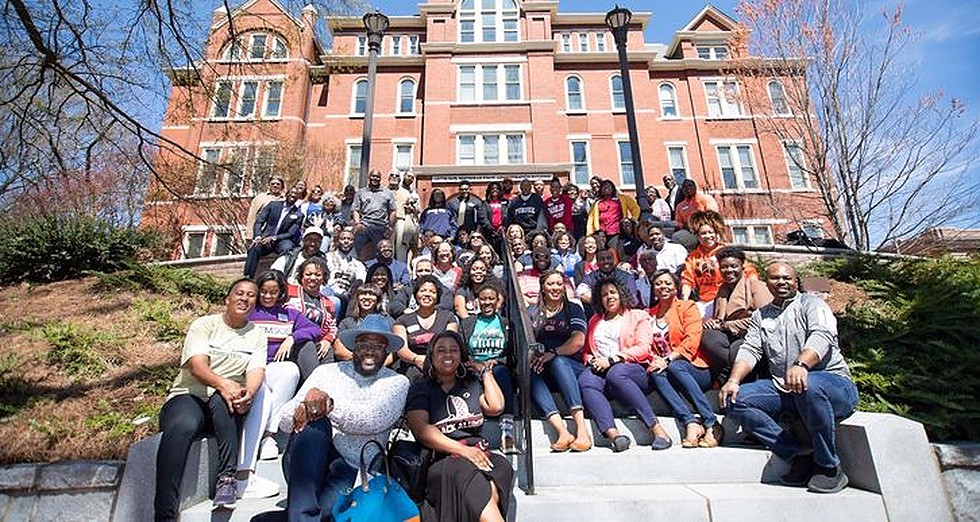Mentor Jackets has been going strong through the Student Alumni Association (SAA) for some time now, but Jeanne Kerney, CE ‘84 and president of the Black Alumni Organization (BAO) noticed a key problem. Black students were not nearly as involved with the program as their peers.
Since Tech was desegregated in 1961, Black students have continuously been overlooked by administration. When Kerney attended in the early 1980’s, there were only two Black professors within the entire Institute.
Society has come a long way since then, but still, only 2.8% of professors are Black as of 2018. When almost two-thirds of professors are white, Black students are forced to look elsewhere for role models of color, especially considering how white-dominated engineering and other STEM fields have been.
“Particularly in the Black community, there’s just a lack of understanding that you need help and that people are there that can help you that have gone ahead of you,” Kerney said.
That’s where Black Mentor Jackets comes in.
SAA and BAO have partnered to create a mentor program for Black students that will reveal opportunities beyond Tech as well as keep students involved post graduation.
“I know, in my own experience, that it helps to talk to someone who’s walked down the path that you’ve walked before,” Kerney said. “You know, we always say you always hear experience is the best teacher, but if someone else has the experience, why don’t you just go ahead and get that information from them?”
Her own daughter graduated from Tech in 2017 and Kerney noticed that her daughter’s friends were constantly reaching out with questions.
She knew that herself and her peers had a wealth of knowledge to share with their younger counterparts.
It was simply a matter of how to best communicate it.
Kerney also wanted Black students to have mentors that could guide them through their time at Tech and beyond, as well as mentors that could make students feel comfortable.
“They feel more comfortable with a mentor that looks like them,” Kerney said. “Most of the students come from a background where the only people they see are people that look like them.”
This idea extends beyond the Black mentor program.
“We need more professors who look like the students, which is not just we need more Black professors,” Kerney said. “We need more Black professors,” Kerney said. “We need more Latinx professors, we need more Pan-Asian professors.”
During her own time at the Institute, Kerney attended on an Reserve Officers’ Training Corps [ROTC] scholarship and found her own role models through the ROTC program, as well as her sorority and the fraternity through which she was a little sister.
Still, she would have been greatly assisted by a program like Black Mentor Jackets if it had existed during her college years.
“It would have been helpful to have someone to always be able to talk to, someone who had already graduated,” Kerney said. “I had a lot of informal upperclassmen mentors, but to have to talk to someone who had already graduated would have been huge.”
Kerney’s biggest asset gained from Tech was the confidence, competence and resilience she needed to begin her career knowing she was capable of greatness.
Now, decades out of college, she is still learning from the mentees she has served as mentor to. Kerney struggles to stay relevant and relatable. She has a hard time communicating the things she would have wanted her 21-year-old self to have known without sounding like a lecturing mother.
“[My role is] encouraging her to make her own decisions, not being dependent on somebody else to make decisions for her,” Kerney said.
Long after the time when she would have had a mentor at Tech, Kerney is inspired by the change she’s seen since her graduation.
While there is still much more work to be done, there have been five Black deans in Georgia Tech history, more than the amount of Black professors in Kerney’s time.
“[Seeing an increase in Black faculty at Tech] feels good,” she said. “Those give me a lot of hope.”
The road forward, however, doesn’t stop there. Kerney would like to see a further inclusion of Black history in school curriculum.
“I look forward to the white professors and the white students really beginning to study and recognize left out parts of the history of the United States and develop true knowledge and empathy of what people that don’t look like them have experienced in the U.S.,” Kerney said.
Further, Kerney is interested in further integration of students of different races and from different backgrounds.
“Segregation is not legal in the United States anymore, but we still live segregated lives,” Kerney said “At Tech, one thing that I know from talking to the students is that the students generally just don’t feel welcome.”
Her advice is for students to reach out to their peers of differing races and ethnicities.
“Just look at your inner circle and say, ‘Can I reach out and find someone that doesn’t look like me, get to know someone who doesn’t look like me, maybe start to study with someone who doesn’t look like me?,’” Kerney said.
Although Black Mentor Jackets is a crucial program for Black students, Kerney also wants to focus on forming mentorships beyond race and gender barriers.
“If you are Black, you have to get a white mentor, and if you are white, you have to get a Black mentor, and there’s an opportunity to do all of that,” Kerney said. “Learn to start to interact with someone that doesn’t look like you.”
The best way to start this process and create a welcoming environment is to inform oneself about the history that has brought the country and its society to where it is today.
Kerney advises non-Black students to pick a book or podcast and use it to educate themselves not just this month during Black History Month, but every single month.
To learn more, visit gtbao.gtalumni.org.
